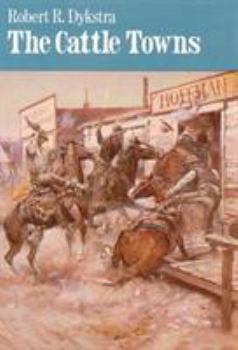The Cattle Towns
Select Format
Select Condition 
Book Overview
"Excellent . . . readable and persuasive. . . . One of the most refreshing and rewarding approaches to be applied to western history topics in many years."-American Historical Review
Format:Paperback
Language:English
ISBN:0803265611
ISBN13:9780803265615
Release Date:October 1983
Publisher:Bison Books
Length:412 Pages
Weight:1.06 lbs.
Dimensions:1.0" x 5.5" x 8.5"
Related Subjects
19th Century Education & Reference History Modern (16th-21st Centuries) State & LocalCustomer Reviews
2 ratings
Progress Through Conflict
Published by Thriftbooks.com User , 16 years ago
In The Cattle Towns, Robert Dykstra demonstrates how five Kansas towns--Dodge City, Ellsworth, Caldwell, Abilene, and Wichita--developed through a complex set of conflicts that bred progress. Instead of adding to the frontier myth of wild and violent cattle towns, Dykstra builds upon studies of urban history and applies them to the developing frontier to create a local, social history that has national relevance. Success or failure of a town depended on a number of variables including location, promotion, and people. Location as related to the county center, railroad lines, and especially for this study, cattle trails, played major roles in determining town futures. Advertisements in newspapers located between the Kansas cattle towns and the source of the cattle herds in Texas lured the trail drivers north. The most important element in the future of the cattle towns, however, was the local population. Although the town newspapers often gave the impression that residents of the town and surrounding areas spoke in a unified voice, that was usually not the case. Disagreements between businessmen and rural folk, ranchers and farmers, natives and foreign-born, and reformers and vice practitioners were frequent. Dykstra contradicts earlier studies that claimed successful town development on mutual cooperation and shows how progress was made through such differences. The differences over town policy provided a forum for area residents to discuss the future vision of their town. Whether the discussion was over alcohol, gambling, prostitution, or the movement of the splenic flu deadline, the result was an exchange of ideas focused on improving the town. Town businessmen, for example, sympathized with the reformers who sought to improve the moral values of the town by eliminating vices, but not at the financial cost of losing the trail drivers who were attracted by such vices and spent their funds liberally throughout town. Due to the advancement of technology and the progression of settlers into the once open Kansas frontier, the cattle towns shifted their focus from cattle to the more consistent industry of agriculture. The westward movement of settlers altered the routes of cattle drives away from towns like Abilene and Dodge City and railroads continued to expand their coverage, removing these towns from the cattle industry. Despite the moral vices that accompanied it, the cattle industry between 1867 and 1885 helped provide an immediate economic base that developed towns and laid the groundwork for future success. Utilizing information from period newspapers, letters, maps, government documents, and previous studies, Dykstra creates a well-written study that explores urban aspirations and rivalry in a frontier setting. By examining the motivations of individuals and groups in the cattle towns, Dykstra has made a valuable contribution to town building on the changing frontier.
A Classic
Published by Thriftbooks.com User , 21 years ago
"One of the most intelligent, interesting, and worthwhile contributions to the field of Western history in some time. [The author] has managed to say something rather basic about American culture in general." -- William H. Goetzmann. "Excellent . . . readable and persuasive. . . . One of the most refreshing and rewarding approaches to be applied to western history topics in many years, for [the author] is asking basic questions about social process and the nature of urban society." -- Howard Roberts Lamar.





